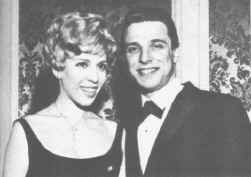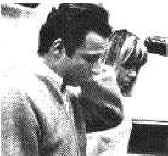

Another of the brilliant professional
songwriting teams employed at New York's Brill Building in
the during '60, Barry Mann and Cynthia Weil wrote dozens of hit
songs for various acts. Besides Goffin/King, this was Don
Kirshner's most productive and gifted team.
Barry Imberman was born in Flatbush on February 9, 1939. Barry's father was an accountant, mother a housewife with a family that included several classically trained musicians. He grew up at 2063 Homescrest Avenue in Brighton Beach. As a child Barry would take occasional piano lessons. His professional ambition as a young man was to be an architect. At fourteen he began writing songs. Imberman was the president of his senior class, leader of the Junior and Senior Sings and member of the Go-Getters, a cheering squad that greeted visitors to the school and did community service.
In the summer he worked as a busboy in the Catskills's -Zalkin's Birchwood Lounge in Ellenville, New York - to earn money for his college tuition. graduated from James Madison High School in 1956. While there he met Jack Keller who was playing in the hotel's band. Keller had heard him playing a song in the dining room; something he had written in imitation of Paul Anka's Diana. called Eileen. Keller offered to to try selling his songs in New York
A guest at Zalkin's who was in music publishing Lowell music gave Imberman his phone number and told him to call if he ever wanted to work professionally. The phone number and friendship with Keller came in handy when Imberman abandoned an architecture studies at Pratt Institute in 1957 to become a songwriter in 1958.
The publisher that had given Imberman his number, with an office in the Brill Building, liked one of his songs The Ecstasy of Love, hired a band and recorded a demo. The song failed to find a buyer, but Imberman used his unspent tuition money to book in a Brill Building studio and record of his songs. Lou Stallman a songwriter, walked in the studio, and asked Imberman to join Round Music, a publishing company that he and Joe Shapiro formed a named after the #1 song Round and Round they had written for Perry Como. He worked there for most of a year, writing with Shapiro, Sid Jacobson and began using the name Mann.
Achieving his first hit in collaboration with Michael Anthony in early 1958 with "She Say (Oom Dooby Dom)," he was hired as a staff songwriter at Aldon Records at $150 weekly, raised to $200 with the second if he covered his advances. Teaming with a number of other writers in the early '60s, Mann co-wrote Footsteps by Steve Lawrence, I Love How You Love Me by The Paris Sisters, and Patches by Dicky Lee. In 1961 he recorded a solo album that yielded the hit Who Put the Bomp (In the Bomp, Bomp, Bomp) co-written by Gerry Goffin.
Cynthia Weil was born October 18, 1940 and raised in Manhattan. She was the daughter of a successful father who owned a couple of furniture stores, who died when she was seven and a straight laced mother.Weil attended the private Walden School, took piano lessons and ballet. She was inspired by a maternal aunt who was a chorus dancer and nightclub choreographer. After attending the University of Michigan for a year, she transferred to and graduated from Sarah Lawrence with a major in theater.
While still in college she performed in nightclubs, dancing and singing. An agent she auditioned for urged her to become a lyricist.
Weil ran the publishing firm of Frank Loesser, the composer of Guys and Dolls, The Most Happy Fella, and How To Succeed in Business Without Really Trying. She collaborate with several staff writers but no songs were published.
While on staff at Aldon Mann met Cynthia Weil who was earning $50 a week. In October 1961 they were married and began writing songs together. It was a perfect marriage of talents, resulting in fifty hits in the next five years.
Tony Orlando recorded Mann/Weils Bless You that reached #16 in October, 1961. The first royalty check Weil and Mann received for the song was $3000, and Mann never had to worry again about earning back his advances from Aldon.
Their early hits included "Uptown" and "He's Sure the Boy I Love" by the Crystals in 1962. "My Dad" by Ray Peterson, "Blame It On the Bossa Nova" by Eydie Gorme, "Only In America" by Jay and the Americans in 1963
Of all their contemporaries, they were the most versatile, able to adapt convincingly to country, soul, MOR, punk or anything else. Mann was able to write lyrics that were controversial or thought provoking, but still palatable to the commercial mainstream, such as "Uptown," "On Broadway," and "We Got To Get Out of This Place".

They were the only Brill team to write directly for Paul Revere and the Raiders, and their 1964 classic "You Lost That Lovin' Feeling" by the Righteous Brothers virtually redefined that scope and depth of pop songwriting. With Phil Spector they wrote some of the best Ronettes songs, like "You Baby" and "Walking In the Rain".
Other hits which they were associated through 1970 include Max Frost and The Troopers "The Shape of Things to Come," Cass Elliot's "It's Getting Better" and "Make Your Own Kind of Music," and B.J. Thomas' "I Just Can't Help Believing."
Mann had few roots in rock and roll. A fan of pop since the era of Frankie Laine and Jo Stafford, he later came to like vocal rhythm and blues, but didn't care much for Chuck Berry and Little Richard. Of the early rockers, only the Everly Brothers made an impression. Cynthia was into show tunes, but knew little contemporary music until exposed to it by Mann.
|
|
Unlike other writers, they wrote most of the time with no idea who the song would go to, and seldom got involved in the production. Though writing songs for other singers, Mann never gave up his ambition to sing, releasing songs under his name yearly. The couple left Aldon Music and moved to Los Angeles in the late 60s, kept writing hits, mostly for country artists and began writing for Broadway. In the mid-70s, Barry attempted a solo career and finally got to make albums via a deal with RCA.In 1975 he had a minor hit with "The Princess and the Punk." Later hits with which Mann is associated with include "Here You Come Again" by Dolly Parton and "Sometimes When We Touch" by Dan Hill, both from 1987. Barry Mann and James Horner composed the music for the 1986 animated film An American Tail. Barry Mann and Cynthia Weil are still happily married after 38 years.
Barry Mann and Cynthia Weil were inducted into the Rock and Roll Hall as of Fame in 2010.
![]()